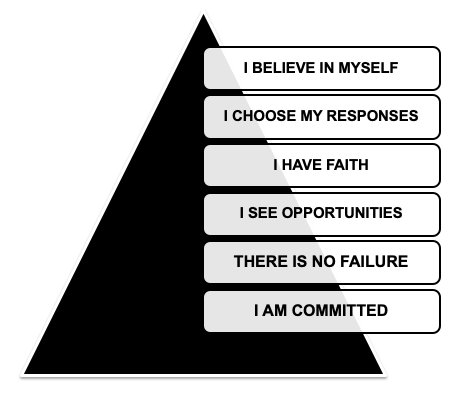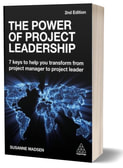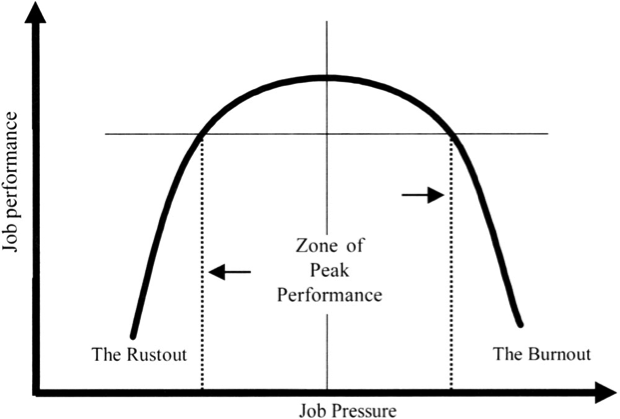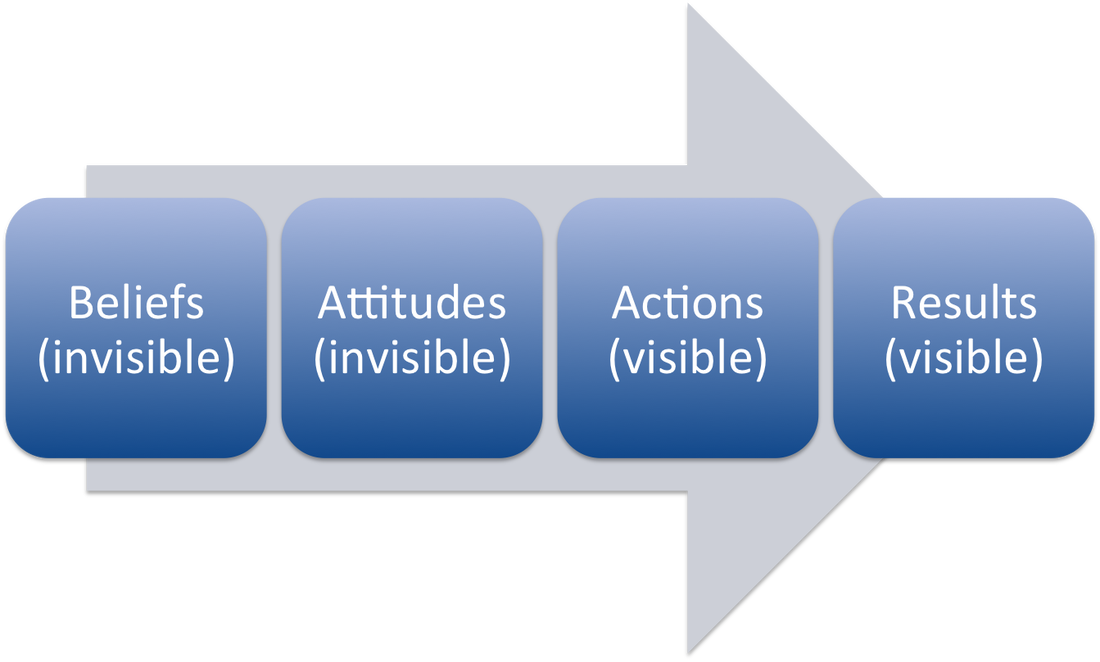As a project leader you have to take control of your internal world and thoughts so that they can influence your outer reality in a way that serves you and your team. The key is to foster a positive and empowering mindset, being aware of how you respond to situations and taking action without hesitation or self-doubt. A positive and empowering mindset is one where you clearly see situations the way they are; the positives along with the negatives. Instead of reacting emotionally to the negative aspects and letting them control you, you carefully assess the situation and consciously decide how to respond.
Let’s examine what some of these empowering beliefs look like.
As a project leadership coach I come across many project managers who feel that they are not good enough. They fear that they will be “found out” and that they will be fired because of incompetence. But in most cases these project managers are judging themselves unfairly – probably because of past events or because of the negativity bias that we all have. The feeling of inadequacy isn’t rooted in incompetence. It’s linked to an underlying lack of self-esteem.
In order to act, behave and be perceived as a leader, you first have to believe in yourself. You will not come across as trustworthy, impactful and inspiring if you do not have a strong regard for yourself. You have to feel that you are worthy of achieving the things that you dream of, and you have to have absolute faith that as long as you take the necessary action, then you can be every bit as successful as everybody else. It is this undeniable belief in yourself and being willing to back yourself all the way that fuels your motivation and moves you to action. This belief in yourself is not about being arrogant, putting yourself above the team or compromising collaboration. It simply means that you feel love and compassion for yourself and that you feel worthy of being a leader. Feel this worth in every cell of your body and don’t leave the house in the morning until you feel a warm glow inside of you.
I choose my responses
One of the most empowering beliefs you can adopt is to know that you are in control of your responses and that you always have a choice. You may not have control over the things that happen to you, but you can control the meaning you assign to external events and how you respond to them. This is a very powerful and mature belief system because it means that you take full responsibility for your actions without having to deflect blame onto others. Essentially, this is about responding to situations rather than reacting to them. There is a subtle but important difference between the two.
Reacting is an unconscious process where you experience and react to an emotional trigger without thinking twice about it. This could happen, for instance, if you always get angry when a team member delivers their work late – or if you get stressed whenever your client asks you to incorporate a new change request.
Responding, on the other hand, is a conscious process that involves noticing how you feel and then deciding how you want to behave. Instead of showing your anger to a team member, count to 10 and choose the most appropriate response so that you don’t default to your automatic reaction. You could for instance explain to the team member how you feel and what the impact is when work is delivered late. You can then work with them to ensure that it doesn’t happen again. Likewise, if you work in a very busy, competitive and reactive environment, you can either see this as a reason to get stressed and feel that you have to emulate that behaviour, or instead you can define your own way of working based on what you know will be best for you and your team.
As an emotionally intelligent leader you have to take responsibility for your emotions and the impact they have on your surroundings. When you manage your impulses and consciously choose your responses, not only do you set a good example, you also create a safe environment for your team to freely communicate and express their views.
I have faith that the right things will come to me as a result of my actions
Part of having a positive and empowering mindset is to trust that as long as you do what can reasonably be expected of you, then the right things will happen. There is no need to worry unnecessarily that things might not work out or to imagine what failure looks like. In fact, focusing too much on the things that you don’t want is likely to derail you because you attract the things that you focus on. This relates back to the filter between your unconscious and your conscious mind. It is your beliefs that determine your reality. If you believe you will fail, chances are that you will. Your only concern should be to take constructive action towards your project leadership goals, stay focused and have faith that the right things will happen as a result. If you encounter a risk, by all means mitigate it, but then let go of it. Spending time worrying about the things you cannot control is lost energy. Empower yourself by being proactive and by focusing on the right strategy and trust that success will follow.
I see the opportunity in every situation
A great way to set yourself and your project up for success is to make sure that you don’t get discouraged or distracted by the issues or obstacles that you come across. We all encounter issues, but the difference between successful people and those who are not is the way in which they deal with the unforeseen. As Albert Bandura said, ‘People with high assurance in their capabilities approach difficult tasks as challenges to be mastered rather than as threats to be avoided’.[i] When something unexpected happens, make sure you don’t use it as an excuse to do nothing or to backtrack. Instead, ask yourself how you can move forward in spite of the issues and which new opportunities have opened up as a result. Your job is to focus on the opportunity and the way forward rather than the obstacle itself.
Let’s look at an example. Let’s assume that your company unexpectedly had to downsize and that you were losing your job. How would you react? What would your focus be, what meaning would you assign to this event and what actions would you take? Would you panic and say to yourself that this is terrible/I’m a failure/how could they do it/it’s their fault? Or would you say to yourself that this is their loss/I could be better off somewhere else/this is an opportunity to learn and do something new? Would you let this unforeseen situation paralyze you, or would you focus on the opportunity it presents and decide how to best move forward? The point is that although you can’t control external events, you can control the mindset with which you react to them. All it takes is mindful practice.
There is no such thing as failure; only opportunities to grow and learn
An empowering mindset is also one in which we don’t let fear of failure hold us back. If you are afraid of stepping up and showing yourself as a leader out of fear that you are not good enough – or that others might laugh at you – then you won’t get very far. You need to alter your view of failure into something constructive and allow yourself to feel the fear and do it anyway. Your ‘failures’ provide the opportunity to learn and grow and will genuinely move you forward as long as you take on board the lessons. And besides, what is the worst that can happen? Wouldn’t it be better to have a setback and to learn from it rather than never to have tried? When you change your thinking pattern into one that doesn’t see failure, you take away an enormous chunk of negative energy and worry. You free yourself up to pursue that which is truly important – your progress and the successful delivery of your project.
When I decided to set up my own company and become an independent project leadership coach, I faced a huge amount of fear. I had been an employee for 17 years and never before run my own business. Would I be good enough? Would people want to work with me and would I be able to make money? It took me many months to overcome this fear and to not let it control me. I did as much as I could to prepare for my new venture, but at the end of the day I had to have faith that as long as I did what had proved to work for other successful entrepreneurs, I would be successful too. I reframed the situation and started to build up a new set of beliefs. I began to study some great entrepreneurs around me and stopped focusing on failure. In fact I began to see my business as an experiment that I would learn from, in one way or another, even if one day I were to go back into employment.
I am fully committed to doing what it takes
We have probably all come across people who are dreamers. They keep talking about their big plans but rarely get around to implementing them. An empowering mindset is one where we are focused and committed and where we consistently take action that moves us closer to the things we want. There is no space for doubt or procrastination. Becoming a project leader who adds value in everything that you do may not be achieved in a matter of days. It will take much longer and will require you to be fully committed to doing whatever it takes and to learn and refine your approach. Sure, there will be times when you lose sight of the overall goal, but your drive, commitment and positive frame of mind will quickly get you back on track. At the end of the day it is your grit that will keep you going.
Interestingly, Psychology Professor Angela Lee Duckworth has proved that grit is the most significant predictor of success – irrespective of the industry or job role you are in. She explains that grit is about stamina and having passion and perseverance for long-term goals. It is about sticking with your future, day in day out, not just for the week or for the month but for years and working really hard to make that future a reality.[ii]
All successful people have needed to rely on their determination to get to where they wanted. Thomas Edison attempted to invent the light bulb 999 times before he finally succeeded. And Colonel Sanders, the founder of KFC, traveled to four different states and had his recipe rejected hundreds of times before he found someone who accepted it. The key is to be willing to have setbacks and be wrong and to start over again with lessons learned.
You can read more about fostering a growth mindset here.
[i] Bandura, A (1994) Self-Efficacy, Encyclopedia of Human Behavior,
New York, Academic Press. (Reprinted in H. Friedman [Ed.], Encyclopedia of Mental Health, San Diego, Academic Press, 1998) [Online] http://www.uky
.edu/~eushe2/Bandura/BanEncy.html
[ii] Duckworth, A (2013) The key to success? Grit, TED, [Online] http://www.ted
.com/talks/angela_lee_duckworth_the_key_to_success_grit
WINNER: PMI UK National Project Awards 2019 - Project Management Literature Category
| To learn more about how to change your mindset and transform into a project leader, get hold of the award winning 2nd edition of "The Power of Project Leadership – 7 keys to help you transform from project manager to project leader". Buy the book on Amazon or directly from the Publisher |













 RSS Feed
RSS Feed